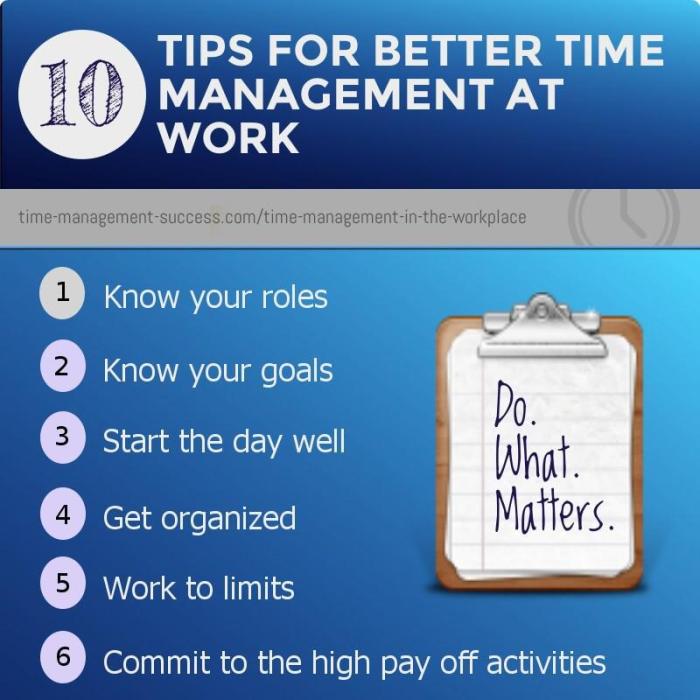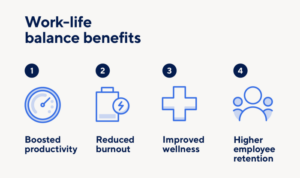Effective Time Management is the key to unlocking your full potential, both personally and professionally. By mastering this skill, you can achieve more in less time and lead a more balanced life.
As we delve into the world of time management techniques, tips for improvement, and essential tools, get ready to transform the way you approach your daily tasks and responsibilities.
Introduction to Effective Time Management
Effective time management refers to the ability to use one’s time wisely and efficiently to achieve goals and maximize productivity.
It is crucial in both personal and professional life as it helps individuals prioritize tasks, reduce stress, meet deadlines, and maintain a healthy work-life balance.
Importance of Effective Time Management
Proper time management can lead to increased productivity, improved focus, and better decision-making skills in various aspects of life.
- Allows individuals to allocate time for important tasks and avoid procrastination.
- Helps in setting realistic goals and achieving them in a timely manner.
- Enhances efficiency and reduces the chances of burnout or overwhelm.
Techniques for Effective Time Management

Effective time management is crucial for productivity and success. Various techniques can help individuals prioritize tasks, manage distractions, and improve overall efficiency. Here are some popular time management techniques:
The Pomodoro Technique
The Pomodoro Technique involves breaking work into intervals, typically 25 minutes long, separated by short breaks. After completing a set number of intervals, a longer break is taken. This method helps maintain focus and prevent burnout by encouraging regular breaks.
Eisenhower Matrix
The Eisenhower Matrix categorizes tasks into four quadrants based on urgency and importance. Quadrant 1 includes tasks that are both urgent and important, while Quadrant 4 includes tasks that are neither urgent nor important. This method helps individuals prioritize tasks effectively.
ABCDE Method
The ABCDE Method involves categorizing tasks based on their importance and deadlines. Tasks are labeled from A (most important) to E (least important). By focusing on high-priority tasks first, individuals can ensure they are making progress on critical objectives.By comparing and contrasting different time management techniques, individuals can choose the method that best suits their needs and preferences. Each technique offers unique benefits and can be tailored to fit individual work styles and preferences.
Tips for Improving Time Management Skills

When it comes to improving time management skills, setting realistic goals and priorities is key. By understanding what needs to be done and prioritizing tasks accordingly, you can make the most of your time and achieve your objectives efficiently.
Setting Realistic Goals and Priorities
- Start by evaluating your goals and breaking them down into smaller, manageable tasks.
- Identify the most important tasks that will have the biggest impact on your overall objectives.
- Set specific, measurable, achievable, relevant, and time-bound (SMART) goals to ensure focus and progress.
Creating a Daily/Weekly Schedule or To-Do List
- Allocate time slots for each task based on their priority and deadlines.
- Use tools like calendars, planners, or apps to organize your schedule and stay on track.
- Review and adjust your schedule regularly to accommodate new tasks or changes in priorities.
Avoiding Procrastination and Staying Focused
- Break down tasks into smaller steps to make them less overwhelming and easier to start.
- Use techniques like the Pomodoro method (working in short bursts with breaks) to maintain focus and motivation.
- Avoid distractions by creating a conducive work environment and setting specific time blocks for focused work.
Tools and Apps for Time Management
When it comes to managing your time effectively, having the right tools and apps can make a huge difference. Here are some popular tools that can help you stay organized and on top of your tasks:
Trello
- Trello is a popular project management tool that uses boards, lists, and cards to help you organize your tasks and projects.
- It allows you to create different boards for different projects, and within each board, you can create lists to break down your tasks into manageable chunks.
- With Trello, you can move cards between lists, add due dates, labels, attachments, and comments to keep everything organized and easily accessible.
Todoist
- Todoist is a simple yet powerful task management app that allows you to create tasks, set deadlines, and prioritize your to-do list.
- You can organize your tasks into projects, set recurring tasks, and even collaborate with others on shared projects.
- Todoist also has a built-in calendar view, so you can see your tasks scheduled for the day, week, or month at a glance.
Google Calendar
- Google Calendar is a widely used calendar app that helps you schedule events, set reminders, and block out time for tasks and activities.
- You can create different calendars for work, personal, and other aspects of your life, and color code them for easy reference.
- Google Calendar also integrates with other Google apps like Gmail, Google Meet, and Google Tasks, making it easy to manage your time across different platforms.


